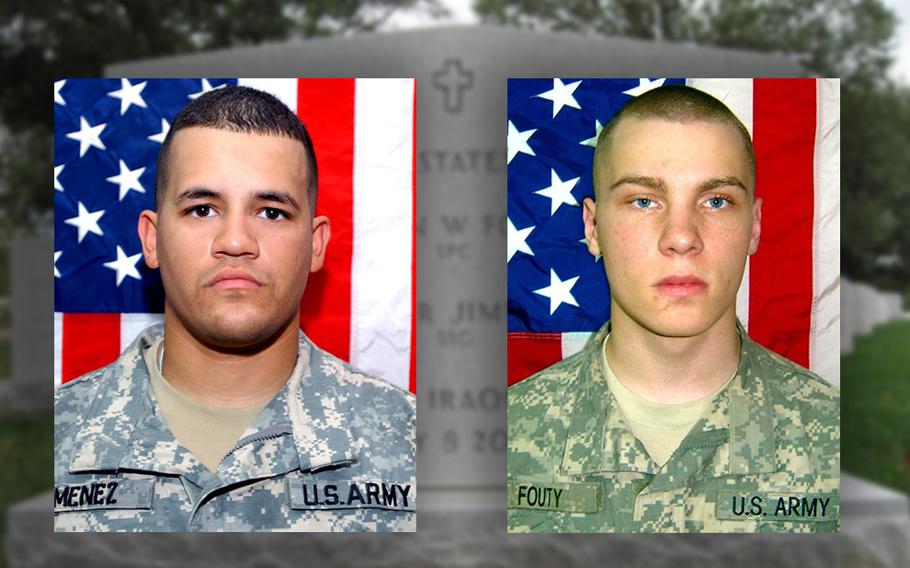
Staff Sgt. Alex Jimenez, left, and Spc. Byron Fouty, soldiers assigned to the 10th Mountain Division who were captured and killed by terrorists in Iraq in 2007. A federal judge has ordered Syria to pay $364 million in compensation to their families, holding the Syrian government responsible for sponsoring the terrorist group involved. (U.S. Army)
Syria owes hundreds of millions of dollars to the families of two U.S. soldiers who were tortured and killed by Damascus-sponsored terrorists in Iraq more than 15 years ago, a federal court in Washington, D.C., ruled recently.
The decision by U.S. District Judge Reggie Walton on Aug. 30 awarded compensation and punitive damages of $364 million to the families of Spc. Byron Fouty and Staff Sgt. Alex Jimenez.
It followed Walton’s judgment in July that the Syrian government was liable for the deaths of Fouty and Jimenez, who were beheaded after their capture with a third soldier.
Fouty, 19, of Oxford, Mich.; Jimenez, 25, of Lawrence, Mass.; and Pfc. Joseph Anzack Jr., 20, of Torrance, Calif., were captured May 12, 2007, during an assault of a military observation post in the village of al-Taqa, near Yusufiyah, south of Baghdad. They served in the 10th Mountain Division, based in Fort Drum, N.Y.
Four other U.S. soldiers and an Iraqi interpreter died in the attack. Anzack’s body was found about 10 days later in the Euphrates River. The remains of Fouty and Jimenez weren’t found until July 2008 and were identified through dental records.
The damage award is vindication for the soldiers’ families, their attorney, Ron Jenkins, said Wednesday.
“I think they do feel a sense of justice,” he said, adding that no amount of money can “undo that type of loss.”
Gordon Dibler, Fouty’s stepfather, said Thursday that he “never looked at it as, ‘Oh, this will make me feel better.’ ”
But it’s a relief for the court “to acknowledge the people responsible,” he said.
Jenkins filed a complaint in 2018 against Syria on behalf of the soldiers’ families. It alleged that Syrian assistance enabled the former Islamic State of Iraq “to abduct, torture and execute Fouty and Jimenez.”
Anzack’s family was not a party in the lawsuit. The plaintiffs consisted of four family members of Fouty and eight of Jimenez, as well as the soldiers’ estates.
The case was tried under the Foreign Sovereignty Immunities Act, which gives U.S. courts jurisdiction over a foreign country that has engaged in terrorism or provided material support to a terrorist group that injures or kills American citizens.
In his July ruling, Walton found that the Zarqawi Terrorist Organization, the renamed Islamic State of Iraq, had acted “with the training, funding, material support, protection, and direction of Syria, as part of a coordinated scheme by Syria to target” U.S. service members in Iraq, according to court documents.
The case had aggravating factors, Jenkins said, which enabled the judge “to make a very sizable award.”
Jimenez’s widow, Yaderlin Jimenez, testified to the emotional pain she suffered while waiting to learn of her husband’s fate.
“It was very hard for the family not knowing what had happened, what (was) being done to him. It was a very desperate (14) months for everybody,” she said, according to court records.
Dibler said he’s always had trouble sleeping but sometimes will “wake up kind of suddenly, thinking about what they were going through,” he said of Fouty and Jimenez. “I still live this every day.”
The plaintiffs were awarded varying amounts, the court ruling shows. The Syrian government did not appear in court or otherwise respond to the complaint, according to court documents.
However, the Syrians will be notified of the court’s decision, said Jenkins, who has been involved in similar cases.
In this case, the U.S. could freeze Syrian assets in the United States, for example, and make those available, or lawyers could try to seize Syrian assets abroad, Jenkins said.
“It’s not easy to do,” he said. “But it is a project we will undertake. If it takes years, we will work on it for years.”
Dibler said that the last time he spoke to his stepson was on his 19th birthday on April 17, a month before the attack. Fouty had been in the Army less than five months, not including boot camp, he said.
“Things happened so fast,” he said. “We miss him every day.”